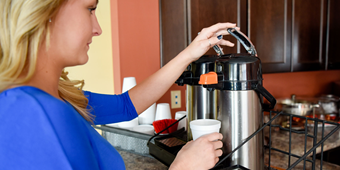When Is It Time to See My Doctor about Bladder and Pelvic Health Issues?

Find Your Perfect Match
Answer a few questions and we'll provide you with a list of primary care providers that best fit your needs.
Talking to your doctor about personal issues like bladder and pelvic health may feel awkward, but keep in mind that millions of women share the same problems. No doubt your doctor has heard stories like yours. Many family practitioners and internists treat bladder problems. However, if your doctor doesn't, ask how to find a doctor who does – a urologist, OB/GYN or urogynecologist. Common problems that may trigger a visit to your doctor include:

- Urinary incontinence, when urine leaks out before you can get to a bathroom
- Pelvic organ prolapse, when pelvic organs, like your bladder and uterus, either bulge or drop from their normal position into the vagina
Remember, if you are leaking urine or bulging in the pelvic area, this is not a normal part of growing older. While some doctors may ask if you’re having any bladder or pelvic health issues, others won’t bring it up. It’s up to you to start the discussion.
“Any time a woman notices the symptoms of pelvic organ prolapse, it’s worth talking to your doctor or seeking help,” advises William Rush, MD, FACOG, a female pelvic medicine and reconstruction surgeon with Lifestages Samaritan Centers for Women. Dr. Rush discusses when to seek help for pelvic organ prolapse.
Click play to watch the video or read video transcript.
Some Questions to Get You Started
- Can what I eat or drink cause bladder problems?
- Could a prescription or even an over-the-counter remedy cause bladder problems?
- Are there medical conditions that cause loss of bladder control?
- What treatments will help me regain bladder control or ease my pelvic prolapse symptoms? What's best for me?
- Do you see a lot of patients with issues like mine?
- If you don’t treat bladder control or pelvic health problems, can you recommend a specialist you trust?
Before You Go
- If you’re having trouble with urine leakage, keep a bladder diary before you meet with your doctor. By writing down when you leak urine – for example, sneezing, coughing, laughing or exercising – you’ll help your doctor pinpoint and treat the cause more quickly.
- Read these helpful tips
 on how to talk with your doctor.
on how to talk with your doctor.
Remember – the more information you can provide at your appointment, the faster you’ll be on your way to easing or eliminating your symptoms.
Find Your Perfect Match
Answer a few questions and we'll provide you with a list of primary care providers that best fit your needs.
Source: William Rush, MD, OB/GYN, Female Pelvic Medicine and Reconstructive Surgeon, Lifestages Centers for Women; American Urogynecologic Society; Womenshealth.gov






